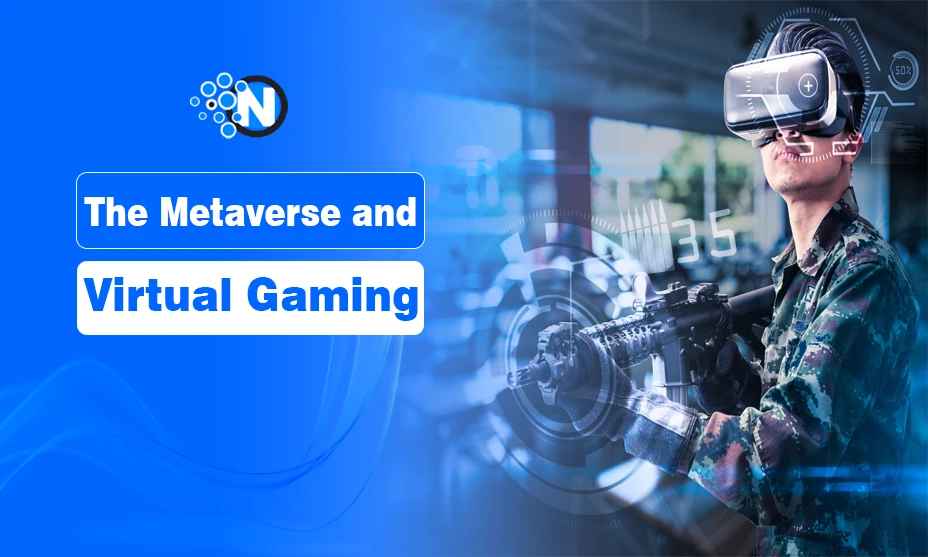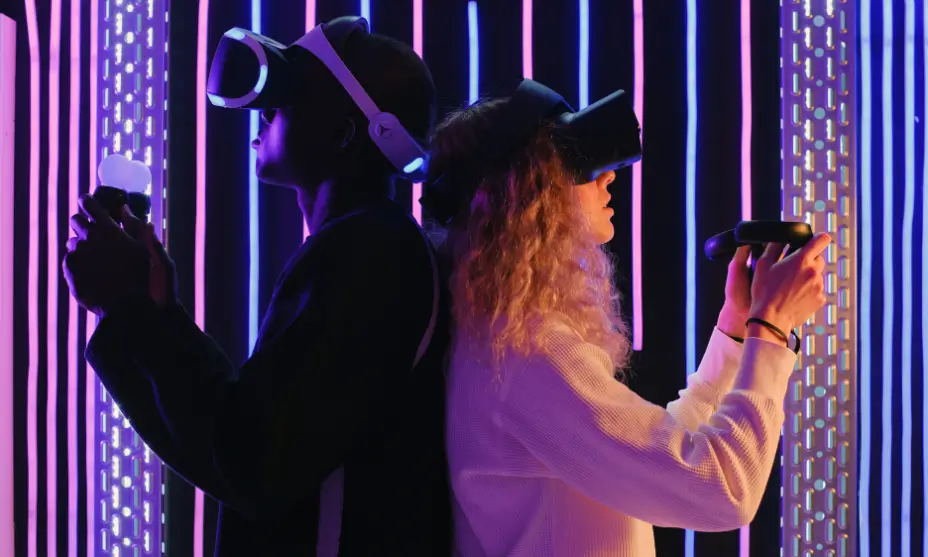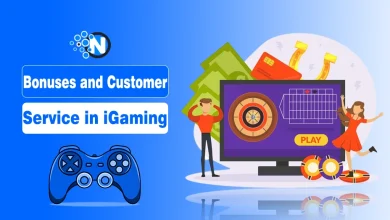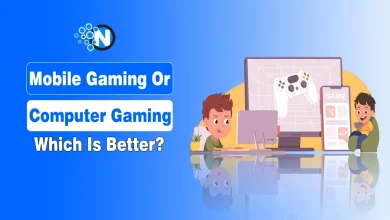The Metaverse and Virtual Gaming: A New Era of Gaming

The metaverse, defined as a collective, shared, virtual space, is already in the process of becoming an innovative space that redefines gaming. Players can explore, compete, and collaborate in 3D worlds while interacting with others in real time through customizable avatars.
Further, it progresses in concept beyond the conventional gaming industry, adding flexible avatars, in-game financial systems, as well as, live social communications while playing and enjoying games.
Let’s get deeper into the metaverse and future of virtual gaming in detail.
What Is Virtual Gaming?
Virtual gaming leverages metaverse technologies to create expansive, interactive, and lifelike digital environments. Virtual gaming, which is an extension of this digital revolution, provides players with new and dynamic gaming experiences that cannot be achieved with conventional gaming platforms.
What sets casinos apart in virtual gaming with their use of VR and AR, creating lifelike visuals, soundscapes, and immersive gameplay? New online casinos are deploying these technologies to gain a competitive edge in VR-enhanced games and AR features like 3D slot machines and virtual dealers to attract modern players seeking unique gaming experiences.
The Evolution of VR and AR in Gaming
Many new virtual gaming are experimenting with virtual reality and augmented reality technologies to enhance the gaming experience. For example:
- VR Games: Some casinos offer VR slots, poker, and table games, which can be accessed using VR headsets. These games provide a more immersive alternative to traditional formats.
- AR Features: Augmented reality introduces interactive elements like virtual dealers or 3D game interfaces, making gameplay more dynamic and engaging
Current Trends in Virtual Gaming
Virtual gaming spans a wide range of experiences:
- Virtual Casinos: Platforms like Decentral and The Sandbox replicate the casino experience, allowing players to wager cryptocurrencies in interactive settings.
- Immersive RPGs and Esports: Games like VR-enabled shooters and AR-based strategy games take competitive gaming to new heights.
- Social and Collaborative Play: The metaverse raises global connectivity, with virtual meetups, tournaments, and events forming communities across various genres.
Key Features of Virtual Gaming
- Immersive Environments: Hyper-realistic visuals, interactive elements, and rich soundscapes draw players deeper into gameplay.
- Customizable Avatars: From appearance to behavior, avatars enhance the player’s connection to their virtual identity.
- Diverse Game Types: Traditional genres coexist with novel experiences like AR-enhanced treasure hunts and VR escape rooms.
- Cryptocurrency and NFTs: Transactions are secure, with opportunities for play-to-earn mechanics and asset trading.
Benefits for Players and the Industry
Virtual gaming’s innovations deliver unique advantages:
- Engagement and Accessibility: 24/7 availability and global reach connect players in new ways.
- Economic Opportunities: Blockchain technologies provide revenue streams through in-game economies and NFT trading.
- Innovation and Growth: The industry evolves through cutting-edge advancements in AI, VR, and AR.
- Personalized Gameplay Experiences: Integrates AI to tailor experiences to individual preferences, such as customized challenges, storylines, and in-game rewards
- Educational Opportunities: Immersive learning tools, teaching strategic thinking, teamwork, or even real-world skills in gamified formats for engaged learning.
- Inclusive Accessibility: Virtual environments offers adaptive controls, audio cues, and visual enhancements for inclusive gaming.

Technological and Economic Implications
Virtual casinos are not just transforming gaming experiences—they’re also reshaping the gambling economy:
1. Lower Operational Costs
Without the need for physical infrastructure, virtual casinos significantly reduce overhead expenses. Operators can reach a global audience without investing in real estate or maintenance.
2. Decentralized Transactions
Blockchain technology eliminates the reliance on traditional payment processors, reducing transaction fees and improving transparency.
3. New Revenue Streams
Features such as NFTs and “play-to-earn” mechanics give both the operators of the games and the players a chance to make money. The users can transfer the stakes during the game or win the corresponding reward for it.
4. AI Integration
Machine learning analytics is being employed to understand player tendencies and provide players with custom-made offers, bonuses, and engagements to increase and enhance player satisfaction.
Challenges to Overcome
The rapid growth of virtual gaming and metaverse comes with hurdles, which I have listed below.
1. Technological Barriers
The development of fully immersive VR and AR environments requires significant investment and technological advancements. Current hardware, such as VR headsets, remains costly and inaccessible to many players.
2. Regulatory Complexity
There are some problems in legislating the peculiarities of virtual gambling, and governments have a hard time doing that. Coupled with this is the matter of licenses, age restrictions, and taxation which require great handling and understanding to address without creating problems.
3. Ethical Concerns
This is especially true when it comes to the issue of responsible gaming, and given the realities of virtual casinos. The lack of appropriate protection measures may result in an increased probability of players becoming addicted.
4. Cybersecurity Risks
As virtual casinos rely heavily on blockchain and digital transactions, they must prioritize cybersecurity to protect user data and assets from potential threats.
The Future of Virtual Gaming
As technology advances, virtual gaming will continue to innovate:
- Advanced VR and AR Technologies: Ongoing advancements in VR and AR will lead to more realistic and immersive gaming experiences that are drawing in larger audiences.
- Blockchain-Driven Fairness: Blockchain integration guarantees transparent and verifiable outcomes to enhance player trust.
- Community Building: Features like chat rooms, virtual events, and social tournaments will strengthen the sense of community among players.
- AI-Powered Personalization: AI will continue to refine gaming experiences, tailoring recommendations, and content to individual preferences.
- Play-to-Earn Models: Blockchain integration will allow players to earn, trade, and own virtual assets through NFTs and decentralized economies.
- Social Connectivity: The metaverse will raise global communities to enable shared events, collaborative games, and cross-cultural interactions.
- Sustainability: Virtual gaming eliminates the need for physical infrastructure. It also offers eco-friendly entertainment solutions.
Conclusion
Virtual casinos are revolutionizing gambling by blending the metaverse’s immersive potential with advanced technology. Despite challenges like regulation and ethics, they promise to redefine entertainment with accessible, interactive experiences. Virtual games, a result of this digitization, are sequels that give players a feeling of the actual, real life experience of many games.




